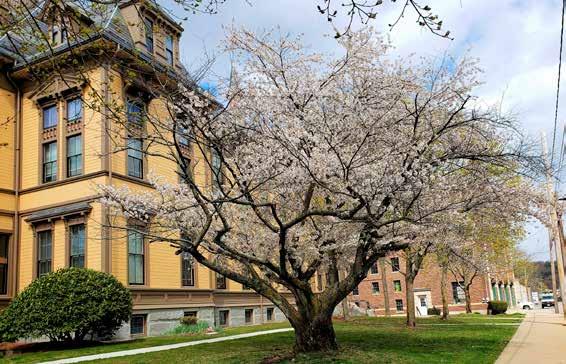THE SAUGUS ADVOCATE – Friday, April 24, 2020
Page 2
An Arbor Day Salute
If you happen to be walking in Saugus Center today (Friday, April 24, Arbor Day), take some time to stop and admire the pink yoshino cherry on the grounds of Saugus Town Hall, facing Hamilton Street. (Saugus Advocate Photo by Mark E. Vogler)
Lawrence A. Simeone Jr. Attorney-at-Law ~ Since 1989 ~
* Corporate Litigation * Criminal/Civil * MCAD * Zoning/Land Court * Wetlands Litigation * Workmen’s Compensation * Landlord/Tenant Litigation
* Real Estate Law * Construction Litigation * Tax Lein * Personal Injury * Bankruptcy * Wrongful Death * Zoning/Permitting Litigation
300 Broadway, Suite 1, Revere * 781-286-1560 Lsimeonejr@simeonelaw.net
We Now Offer For Your Eating Pleasure
“UBER EATS” Convenient Delivery Service Bianchi’s Pizza and Renzo’s Full Menu To Go
Open for Takeout for Bianchi’s Pizza and Renzo’s Food 381 Revere Beach Blvd., Revere
781-284-5600
MONEYWISE | from page 1 get that Crabtree and his financial staff crafted to become obsolete. Instead of getting ready to advocate his plan that would carry town government through June 30, 2021, Crabtree is worried as to whether the town will have the revenue to close out the current fiscal year. Running town government has become a bundle of uncertainties as the cost of protecting Saugus residents from COVID-19 has become the top priority for Saugus, every community in Massachusetts, every state in the country and every nation on earth. “We’re trying to keep business as usual. But, it’s really not as usual,” Crabtree told the Board of Selectmen at Tuesday (April 21) night’s meeting, the second one held through Zoom Video Conference. In his report to the board, Crabtree said dealing with the health crisis on the local level has already cost the town from $600,000 to $700,000 “in emergency spending for this virus.” Much of that money has gone for staffing in the town’s Health Department, for necessary supplies and for implementing various programs to educate and protect the public from the disease that has already killed more than 2,000 people in Massachusetts – including four Saugus residents. “This is a moving target that we’re going to have to figure out – finances and providing services for residents here
and to keep the government moving,” Crabtree said. “We’re trying to figure out what we’re looking at for deficits, whether it’s revenue or appropriation deficits. Hopefully, there will be relief from the state, at least from the accounting part of it. We’re trying to make sure we have enough money to try and pay employees,” he said. The dilemma of endangered revenues The major sources of revenues that pay for the town’s municipal services are all in jeopardy because the state has shut down nonessential businesses that draw crowds. Several thousand business owners who are losing money and homeowners who have lost their jobs will have trouble paying their tax bills on time. Hotel and meal taxes that generate about a million dollars a year will be depleted greatly because of the lack of business at restaurants and hotels along the Route 1 business corridor. The inability of business and home owners to pay their taxes will lead to a flood of applications for abatements. With numerous businesses shut down, the water and sewerage enterprise funds will generate less revenue. “ Think about this: All of the businesses are closed. How long they’re going to remain closed is going to have a major effect on the amount of water that is being used,” Crabtree said, “so when the water consumption goes down, we bill out less. We now run into a deficit with what we expected for revenues.” Selectman Debra Panetta was curious about the fiscal challenges facing the town because of COVID-19. “Any idea on what that impact is going to be or is it just too early to say?” Panetta asked. Crabtree responded that “it’s far too early to say… I don’t want to throw out numbers to worry anybody. But this is going to be pretty significant, and so I think for us to be able to have healthy, fiscal books here in Saugus – having the ability to tap into free cash for unexpected occurrences within the fiscal year, that puts us in a much better place,” Crabtree said. “And also having the stabilization money. Those are the things that we’re going to have to definitely tap into, to be able to withstand this, because from an economic standpoint, some of these businesses aren’t going to open up.”
Time is a huge factor Wendy Hatch, the town’s finance director and treasurer/collector, and other members of the town’s financial team have been monitoring the fiscal situation and making projections. “But it’s very difficult to sort of put a gauge on it because we don’t know how long this is going to last,” Crabtree stressed. “Even if they open restaurants two weeks from now or a month from now, I don’t know what kind of rollout or what kind of business they are going to do. That affects the water usage. That affects a whole bunch of things,” he said. Developing a public confidence that all health issues have been addressed and that people can return to work without worrying is crucial, according to Crabtree. “There has to be some sort of confidence for the economy to come back. And the economy coming back is what’s going to help the town stabilize, with people employed and people doing things,” Crabtree said. “But, obviously, that has to be done in a certain manner and in a certain way when they know enough about the virus and how to protect ourselves,” he said. “Having stabilization and having free cash – that will, hopefully, balance us so we are not in a position that we have to reduce or eliminate services to the public and/or lay employees off.” The town has a stabilization fund of more than $9 million and additional $1 million to $2 million to draw from in free cash, according to Crabtree. But it’s still not clear how far that money will go before the costs of COVID-19 become insurmountable. Unexpected costs – like buying face masks and shields for volunteer election workers in the fall for the state and presidential elections – will only add to the escalating price of town government. “I t ’s a lot of worries to keep things moving and see where we are. It’s significant moneywise,” Crabtree said. “We’re in unprecedented times. We’re trying to figure out where we are going to be with the emergency spending that we’re involved with to fight the virus and to address a plan for what’s happening now with this health crisis as well as worrying about what money is going to be collected and timing-wise what’s going to be collected.”













